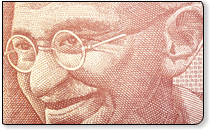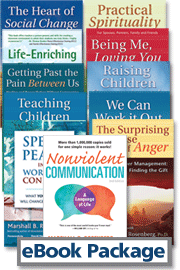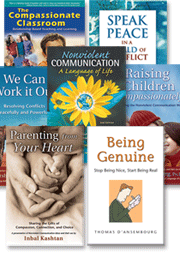Gandhian Principles... continued
When opponents, even oppressors, are seen as humans possessing care, dignity, and a heart that can be reached, then speaking to their humanity becomes a logical and direct approach to transforming the situation. In Gandhi's own words:
"Nonviolence in us ought to soften our opponent, it ought to strike a responsive chord in his heart." ( Everyman's , August 20 – Harijan: May 13, 1939)
Gandhi's life and work provide some astonishing examples to illustrate this radical concept. Gandhi's great first "experiment with truth" was designed to recover the dignity of the Indian community of South Africa. His chief "enemy" at the time was General Jan Christian Smuts, head of the South African Government in the Transvaal. Here's an account of an early confrontation with Smuts:
"Gandhi goes to the head of the Transvaal government General Smuts and says: 'I've come to tell you that I am going to fight against your government'. Smuts responds: 'Anything more?' Gandhi: 'I am going to win'. Smuts, laughing: 'How?' Gandhi: 'With your help.' ( Gandhi the Man , p. 47)
Smuts' secretary provides a rare testimonial about what it feels like to be offered Satyagraha by committed, well-trained activists:
"I don't like your people, and do not care to assist them at all. But what am I to do? You help us in our days of need. How can we lay hands upon you? I often wish that you took to violence like the English strikers, and then we would know at once how to dispose of you. But you will not injure even the enemy. You desire victory by self-suffering alone… and that is what reduces us to sheer helplessness". ( Search for a Nonviolent Future , p. 64)
As a result of years of such encounters, Jan Christian Smuts himself experienced a complete transformation. As Gandhi said:
"In a non-violent conflict there is no rancor left behind, and in the end the enemies are converted into friends. That was my experience in South Africa with General Smuts. He started with being my bitterest opponent. Today he is my warmest friend" ( Everyman's , May 16 - The Mind of Mahatma Gandhi)
Smuts also attested to this shift. Eventually he came to believe that he was "not worthy to stand in the shoes of so great a man" as Gandhi. ( Mahatma Gandhi: essays and reflections on his life and work , p. 226)
A particularly striking example of Gandhi's commitment to seeing everyone's humanity took place in the late 1930s. Gandhi was at a meeting to pressure the local Maharaja to democratize in Rajkot. Thugs came and started beating up the participants. After a short while, Gandhi, who was trembling with revulsion and determination, told all his followers to go home and leave him alone with the thugs. The thugs were completely won over and offered to escort him back to the ashram. ( Incidents in Gandhi's Life , pp. 99-101)
British historian Arnold Toynbee summarized the effect of years of satyagraha : "Gandhi made it impossible for us to continue ruling India, but at the same time, he made it possible for us to abdicate without rancor and without dishonor". ( Search for a Nonviolent Future . p. 189)
Similarly, the history of nonviolent movements in the United States contains many moving stories of demonstrators creating powerful human connection with police officers and changing the dynamics of tense moments as a result. Here's one example:
"We went to the Nevada Test Site in 1982 to draw attention to underground nuclear testing. During the season of Lent, we were there daily, standing along the road as the workers drove by us in buses and cars. Each day we spoke to the sheriffs from Nye County and the Wakenhutt Security officers who were there because we were there. Any idea of "them" and "us" broke down over those days of human connection. At the end of the 40 days of witness, 19 of us committed civil disobedience--walking past the boundaries created for us.
"Jim Merlino, the head sheriff, instructed his officers as they were arresting us to "treat us like we were his children." Each year we went back during Lent and at other times too. We became friends with several of the officers. We greeted each other with hugs and asked about each other's lives. We always talked to them about what we were doing and why we were there too, and respectfully agreed to disagree. When Terry and I got married in 1986, we invited Jim Merlino to the wedding. He was not able to attend but sent us a gift. He has long since retired, but I still am occasionally in touch with him. To this day, our organization--Nevada Desert Experience--has an exceptional relationship with the security forces at the Nevada Test Site."
– Anne Symens-Bucher, NDE co-founder.
Moving from the arena of social change to the challenges of everyday living, the practice of NVC calls on us to remember, even in the midst of intense conflict, that others are more like us than we imagine some of the time. For example, when someone says "no" to a request of ours, we can transcend the habit of believing this means they don't care about us.
Nonviolence becomes challenging precisely when people don't do what we want. In those moments we can extend care to others through recognizing and appreciating the needs that wouldn't be met for them if they did what we want.
If there's any way that another person will come to want to give us what we ask for, it is much more likely to happen through providing the relief of acceptance and care to them, which softens the heart and can create possibilities where none seemed available. Instead of forcing our way or giving up, the practice of NVC entails dialogue that connects with both parties' needs and generates mutual goodwill.
The next segment of this 7-part series explores the 5th principle that NVC shares with Ghandian nonviolence: the commitment to work towards resolving conflicts by finding solutions that work for everyone, and resorting to use of force only to protect life in extreme circumstances.
The complete bibliography for the series can be found online at NVC Gandhian Principles Bibliography . Part 3 of this series contained a link to the worksheet:
Practice: Transforming Judgments and Enemy Images
The complete bibliography for the series can be found online at NVC Gandhian Principles Bibliography.
(1*) The issue of why acting on these needs would take the form of such unimaginable actions is beyond the scope of this article. I believe anyone interested in exploring further the roots of violence could benefit enormously from James Gilligan's book Violence: Our Deadly Epidemic and Its Causes . Gilligan discusses, in particular, the role of shame in leading to violence and cruelty.
Miki Kashtan is a co-founder of Bay Area Nonviolent Communication. She leads workshops and intensive retreats in Nonviolent Communication throughout the United States and in Japan, Europe, Brazil, and Africa, and offers mediation, meeting facilitation, coaching, and training for organizations. Miki hosts the Conflict Hotline, a monthly live call-in TV show, and blogs regularly at The Fearless Heart . She holds a Ph.D. in Sociology from UC Berkeley and her articles have appeared in Tikkun magazine and elsewhere.
Keep learning these vital communication skills with these books and training resources:
This Month's Specials:
- All NVC eBook and eBooklet Packages - Save 60% through
May 31, 2011
- Reference Library Book Package - Save 55% off list price through May 31, 2011
Every Day Specials:
- NVC Starter Kit Book Package - Save 40%-50% on this book package every day from PuddleDancer Press
- NVC Marshall B. Rosenberg, Ph.D. Book Package - Save 45%-55% on this book package every day from PuddleDancer Press






